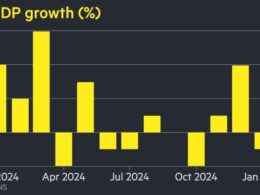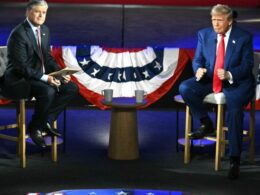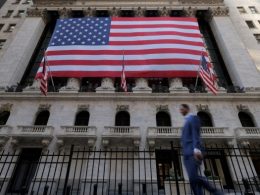Unlock the Editor’s Digest for free
Roula Khalaf, Editor of the FT, selects her favourite stories in this weekly newsletter.
Donald Trump’s tariffs on global US imports will dent the UK government’s fragile growth ambitions and hit key manufacturing sectors, industry groups and economists have warned.
The 10 per cent levy — while less than the 20 per cent faced by the EU — will weaken demand and disrupt supply chains, at a time when businesses are already facing rising costs, they said.
“Orders will drop, prices will rise, and global economic demand will be weaker as a result,” said Shevaun Haviland, director-general of the British Chambers of Commerce. “This is a lose-lose situation for everyone.”
Emma Rowland, trade policy advisor at the Institute of Directors, said the tariffs would be “a blow to British businesses”, that would force many to reassess the viability of the US as both a market and a supply-chain hub.
The UK’s economy has barely grown since the spring of last year, while the outlook for 2025 has worsened.
Andrew Goodwin, chief economist at the consultancy Oxford Economics, now expects the UK economy to grow at just below 1 per cent in 2025 and has cut the 2026 forecast to close to 1 per cent from previous estimates of 1.5 per cent, as a result of the larger than expected tariffs on US imports.
The Office for Budget Responsibility has already warned that any slowdown in the UK’s growth will eat into the financial headroom set aside by Rachel Reeves — something that could force the chancellor to raise taxes further later in the year.
Thomas Pugh, an economist at audit, tax and consulting firm RSM UK, said the tariffs mean “another year of stagnation at best”.
Markets have already tweaked their expectations for what the tariffs mean for Britain’s interest rates. “This reduction in growth will probably make the Bank of England more likely to cut interest rates this year, so we still anticipate three more [quarter-point] cuts in 2025.”
Pugh echoed concerns that lower growth would eat into Reeves’ already limited fiscal headroom. “We wouldn’t go as far as to say this has wiped out the £10bn she just rebuilt, but it’s probably not far off,” he added.
Although the UK sells more services than goods to the US, key export industries were left reeling after Wednesday’s announcement.
British farmers have warned the 10 per cent tariff could hit the £2.5bn agrifood and drink export market. The US is the UK’s second-largest destination for British food exports after the EU.
“While the UK has been hit by a lower baseline tariff compared to the EU, this remains a challenge for the UK and for agriculture,” said National Farmers’ Union president Tom Bradshaw.
Scotland’s deputy first minister Kate Forbes also warned the tariff on UK goods could lead to annual losses of £200mn —£400mn in Scotch whisky exports. “This is a matter of huge concern for industries most affected,” she said.
There was some relief in the UK’s struggling steel sector after the White House opted not to apply additional tariffs on top of an existing 25 per cent levy. But industry groups warned of indirect effects if UK firms exporting finished goods cut production. The auto sector, which makes up 14 per cent of UK steel demand and also faces a 25 per cent US tariff, could be particularly exposed.
Although Britain’s car industry is heavily reliant on European exports, around one in six of the cars shipped goes to the US, and it is the largest market for high-end brands such as JLR, Bentley and McLaren.
“These tariff costs cannot be absorbed by manufacturers,” said Mike Hawes, chief executive of the Society of Motor Manufacturers and Traders.
“US consumers may face additional costs and a reduced choice of iconic British brands, while UK producers may have to review output in the face of constrained demand,” he added.
Some UK manufacturers, however, see a potential upside. James Leng, managing director of Pre-Met, which assembles metal components, said: “Manufacturing in the UK, potentially, just became 10 per cent more competitive than the EU — and even more so compared with other low-cost countries.”
Trump hit Thailand, Vietnam, Taiwan, and Indonesia with tariffs ranging from 25 per cent to 46 per cent.
“Potentially, I could see some global firms at the top of the supply chains, starting to look down their suppliers for UK-based production,” said Leng.

Broadly, business associations are urging the government not to give up on negotiations over a trade deal that Sir Keir Starmer has said may lead to an elimination of tariffs altogether.
“Tariffs can be lifted at any time and the US has signalled its willingness to do some form of deal with us,” said Haviland.
Reeves said ahead of Trump’s announcement on Wednesday that there would not be any rush to respond to US tariffs, but she warned that even if there is an agreement with the US, “that doesn’t mean somehow we are out of the woods and not impacted by tariffs”.
Source link










